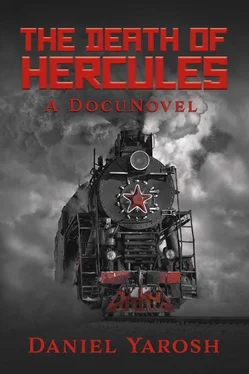The two assassins stumbled from the ambassador’s office into the chaos that had become the German embassy. Office clerks and military officers fled through the front doors to the street and Andreev followed at full pace to the waiting car. Bliumkin hobbled in biting pain, and at one point was helped by a young guard to clear the entryway.
“Come on!” Andreev shouted. He was about to tell the driver to drive on when Bliumkin emerged from the panic on the walkway. Andreev threw open the door and Bliumkin dove in. “Drive!” Andreev yelled as he banged the driver’s shoulder, and the car sped from the scene of smoke and mayhem. “To Bolshoi Trekhsvaititel’skii Pereulok!”
“The Pokrovskii barracks?”
“ Da .”
**********
While news of the assassination of Ambassador Mirbach spread through Moscow, Maria Spiridonova climbed to the stage of the Bolshoi Theater. She had straight black hair cropped short with bangs, and a long face with pitch-black eyes. Her complexion was sallow today from too little sleep and she wore no make-up. Her coarse wool suit hung loosely on her thin frame. She strode to the podium with the sound of thunderous applause of the Left Socialist Revolutionary Congress of Soviets. Spiridonova was a close companion of Lenin, who admired her for her blunt honesty and steely determination. She had spent most of the past six years in Tsarist prisons, suffering deprivation and humiliations especially reserved for women revolutionaries. But she was a tireless organizer even within prison. When the Revolution came Spiridonova already had a strong base of support with the Left Socialist Revolutionary wing of the Bolsheviks.
She began her speech with the perfunctory congratulations on the overthrow of the ruling class, and praise for the leaders who now led the worker’s state. “We have accomplished much, maybe all we could ask for,” and she paused for the lengthy applause.
“But now, dear Comrades, we have gone astray. What we saw in our corrupt nobility we cannot see across our borders. The oppression of workers did not begin with Mother Russia, so why do we think it stops here? We could not change the monarchists here in Moscow, and we could not make peace with those that exploited the proletariat of our farms.” She paused, and the silence in the Theater was deafening.
“So how can we now make peace with a Kaiser!” The crowd erupted. “How can Comrade Lenin lie down with the butcher of the masses” she shouted over their roar. She paused again, and the cheers subsided, but the electricity singed the air. “The Bolsheviks have made Lenin their king, and the worship of Vladimir Illeyivich above loyalty to our class. Our brave and glorious Army of Red is not pointed outward at enemies of the state! It points inward at those who carried the Revolution on our backs! Our bullets don’t kill German invaders! They kill our Russian farmers! We don’t seize the tools of foreign capitalism, we steal food from our own people!” The crowd exploded again. Now the delegates looked at each other – how dangerous was this talk?
“Today marks a new day of the Revolution”, Spiridonova continued. “Today we put aside the Bolsheviks, and the cult of Lenin. Today we stop the killing of our Russian people by our own hand. Today we drive German pigs from our land! We don’t make peace with the enemy, we annihilate them!”
“Just this day, we have eliminated the German presence in our capital. The German representative Mirbach is dead, and a clear message has been sent to Berlin. Get out! And by tomorrow we will replace Comrade Lenin with leaders who fight for the masses, not slaughter them. The people will know that we will guide them to a new dawn of truth.”
But when the delegates peered out the windows from the mezzanine of the Theater, they saw through a heavy fog several Red Army trucks circling the building, and Cheka soldiers in battle grey flannels and boots, with weapons drawn and pointed at the exits.
**********
It didn’t take long for news of Mirbach’s death to reach the ears of Lenin. The German representative who told him was quick to report that it was on the instructions of General Dzerzhinsky that the assassins were admitted into the embassy. Lenin was horrified that the peace between Germany and Russia would crumble just when he faced a revolt from the LSR. After a few inquiries Bliumkin and Andreev were traced back to the Pokrovskii barracks. Lenin dispatched General Felix Dzerzhinsky himself to apprehend the two and reverse the humiliation.
Dzerzhinsky went quickly and took two carloads of armed Chekas to make the arrest, but he miscalculated. A torrential rain beat down on Moscow, and ominous thunderclaps were heard off the horizon. He was met at the barracks by at least fifty armed soldiers barring the main door, taking shelter in the overhangs by the side doors and ogling from the open windows despite the stormy July night.
“I have come for the traitors, Bliumkin and Andreev,” Dzerzhinsky called out, as rained dripped down his cap over his face. He stood with his legs apart and his hands clasped before him. Some of his Cheka guards stood uncomfortably soaked by his side, while others remained protected in the cars.
“And who are you?” someone called from inside the building, behind the soldiers at the door.
“I am General Dzerzhinsky, of Cheka.”
“We already have a General,” and Combat Detachment Commander Nicholai Popov stepped from between the men at the door. Commander Popov was the military strategists for the Left-Socialist Revolutionaries.
“I have come for the traitors on orders of our Supreme Leader, Comrade Lenin.”
“I heard it was General Dzerzhinsky who sent them,” Commander Popov said with a sneer. A few men nervously shifted their feet.
“I did not.”
“Then you must not be General Dzerzhinsky”. The soldiers in the windows erupted with laughter.
“I did not come here to play word games, Commander,” Dzerzhinsky said.
“Then I don’t know why you came.”
Dzerzhinsky signaled with his arm and his Cheka guards raised their rifles at the Commander. At that fifty rifles from the upper windows of the barracks pointed at the two carloads of drenched men at the barracks entrance. A thunderclap split the silence.
“I am arresting you for impersonating General Dzerzhinsky!” cried the Commander. And with that the head of the Soviet Secret Police was disarmed and imprisoned. By nightfall the LSR had taken the Moscow central telegraph office and much of Moscow had fallen into the hands of the rebels.
**********
Zalmund and Deena, Tad and Nadja, Miro and Myrna, Lenish and Petra were all awakened late that night by banging on the apartment door. The Captain was calling all security units to report immediately to the Kremlin. They were instructed to bring as much food as they could carry, and rain gear, which few had. Zalmund struggled into his long, grey flannel trousers and collarless white blouse, put on his only woolen coat and stuffed the bread he had into his pockets. Finally, he laced up the leather boots that didn’t fit particularly well and were worn through in a small spot on the tops and in the sole.
At the Kremlin Zalmund was assigned as a driver to Josef Kikulsky, the same man from Lublin, who was now a feared Cheka captain, and who was entrusted with only the most serious cases. Tad, Miro and Lenish were issued the favored Cheka Mauser automatic pistol and they took a black sedan with an oil leak from the motor pool. The rain had stopped, and a dense fog hung in the cool air, with a smothering humidity. They drove through deserted streets of Moscow that were eerily quiet at dawn.
Commander Popov was a Russian officer in the Cheka, and since he served as a commander at the Pokrovskii barracks he had the privilege of bringing his family to Moscow. They stayed in a run-down section of Moscow, living on the few rubles the Commander occasionally received and the neighborhood charity for a soldier of the Revolution. Zalmund parked the car in front of a narrow, wooden two-story apartment building and the men walked the stairs to the second floor flat. There Captain Kikulsky waved his Mauser, and in ungrammatical Russian ordered Popov’s wife and two young children, an older boy and a younger daughter, down the stairs and into the street. A Cheka car in this neighborhood was not a usual or welcome site, and many of the neighbors cautiously peered out between the curtains.
Читать дальше












